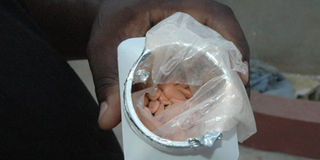Prime
How often should an adult de-worm?

Albendazole is the most commonly used de-worming pills. Worm infestation may present with diarrhoea, loss of appetite and abdominal cramps. File photo
What you need to know:
Worms are parasites that inhabit several places including our bodies. They include hook, pin, round, and tape worms. People get infected by worms if they eat undercooked meat or dairy products, raw salads and eggs, or if they get in contact with infected animals such as cats.
Dear Doctor: There is common talk that that people with big stomachs are those who do not de-worm. How often should an adult de-worm?
EK
Dear EK: How often a person should de-worm depends on how exposed they are to getting worms. The most common worms are acquired when people walk barefoot, during gardening or from pets such as dogs and cats.
Worms can also be got from eating unwashed or undercooked foods such as salads and drinking untreated water.
Worm infestation can cause serious health problems especially in children by impacting their growth, weight and can also affect a child’s ability to attend and perform well in school. De-worming regularly, at least once every six months is recommended, but this should be done in consultation with a doctor.
A big stomach is caused mainly by fat, but also gas, fluids and faecal matter, especially if a person has constipation.
Dear Doctor: I had a coil inserted in my uterus in 1990. However, even with it, I was able to conceive. Doctors failed to remove it during delivery because it was embedded in the uterus.
I was told I can live with the coil inside me without any complication, unless I choose to remove the uterus. In recent months however, I have developed weakness in the limbs, sudden dizziness and numbness. Could it be because of the coil? I am 61, HIV positive and on anti-retroviral medication.
Maggie
Dear Maggie: It is likely that the symptoms you have are due to the side effects of the drugs you are taking, which requires that you consult your doctor and find a way to manage the problem.
At 61, having had a coil in the womb for many years, it is not necessary to remove it now because that would require an operation. Removing the coil together with the uterus is the most appropriate solution at your age. This could also help prevent cervical cancer.
But since your doctors do not see any risk in you having the coil in the uterus, you may leave it there and not have surgery carried out altogether.
Dear Doctor:What happens if a woman cannot feed properly during pregnancy and what can be done about it? Salma
Dear Salma: . Proper feeding is good for anybody, but especially for a pregnant woman and her unborn child. During the first trimester, a woman may experience nausea and vomiting, which in most cases is not consequential. But if the vomit is excessive (hyperemesis gravidarum), it makes it difficult for an expectant mother to eat or drink fluids.
Failure to properly feed or drink may result in dehydration and malnutrition, putting the life of the unborn child and mother at risk.
Sometimes, even without morning sickness, a pregnant woman may crave for certain foods and fail to eat others. As a result, she may miss out on proper nutrition.
Many women eat for two or three when they are pregnant, leading to obesity and gestational diabetes. This may also have an impact on the foetus or later in life.
What a woman eats during pregnancy has an impact on the long-term health of the unborn child. Inadequate nutrition, especially early in pregnancy, may impair general foetal and brain development, leading to abnormalities. This may also affect hormonal function and utilisation of energy, leading to long-lasting health implications for the baby, including brain and spinal cord problems, hypertension and obesity.
When the organs of the unborn child do not develop properly, this may cause heart abnormalities.
Vitamin A (which includes supplements and liver) and alcohol consumption should also be avoided.
It is important for a mother to eat a balanced diet, but in case she cannot, she should seek help from an antenatal clinic.
Dear Doctor: Whenever I sleep during the day, I wake up feeing full in the stomach but weak. However, I always fail to get sleep at night and end up using sleeping pills.
Zeresire Yomuhiigi
Dear Zeresire: The human body has a biological clock, which helps us stay awake, active and energetic during day and asleep at night.
It is therefore not surprising that when we sleep during the day and interfere with the biological clock, we wake up weak and fail to sleep at night.
Sleeping less at night creates a problem of sleep-debt, which keeps a person sleepy during the day and creating a vicious cycle.
You should avoid sleeping during day if you want to do so properly at night. Taking drugs will make the problem worse, as it will lead to addiction and related side effects.
Digestion of food is better when we are active (during day) but at night when we sleep, it slows. Therefore, going to bed immediately after a meal, is likely to leave a person bloated or with heartburn.
This is likely to be more noticeable when a person takes a nap immediately after a heavy meal because digestion is likely to be complete sleeping after dinner because of the many hours we sleep at night.




